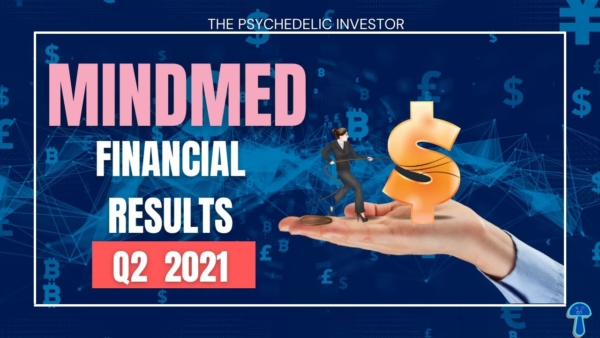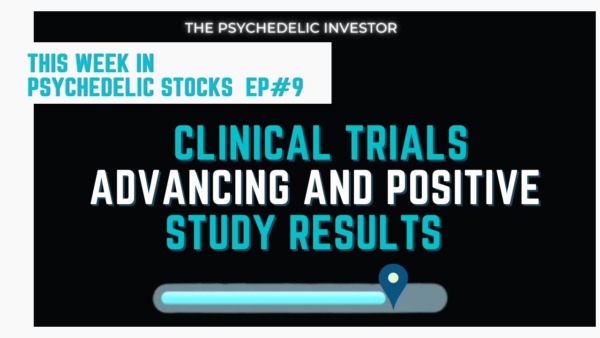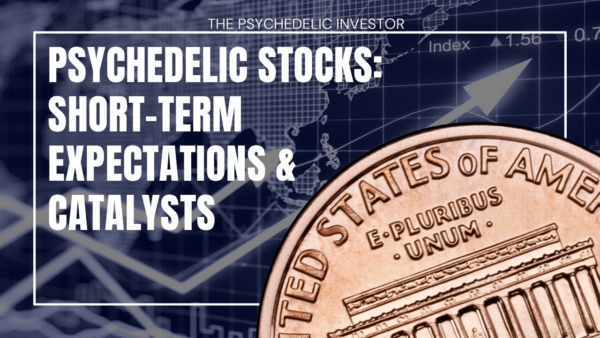
When it comes to psychedelic stocks, MindMed (NASDAQ: MNMD), (NEO: MMED) has long been the darling of the retail investor community. With a vast psychedelic-medicine clinical pipeline that includes psilocybin, MDMA, a next generation version of ibogaine called 18-MC, and DMT, it is easy to see why.
But if there is one psychedelic compound that MindMed is most closely associated with, it is LSD. The company has many projects using the psychedelic, including attempting to treat suicide headaches, chronic pain, depression, and ADHD. Their flagship program, Project Lucy, is attempting to treat Generalized Anxiety Disorder with large doses of the compound, paired with therapy.
The only problem is, unlike with MDMA and psilocybin, in the modern era we have seen little to no human clinical data on the efficacy of LSD in treating any mental health condition. Whereas MDMA has a Phase 3 trial showing that 88% of PTSD patients saw their symptoms decrease by 50% or more, and psilocybin has many studies showing its effectiveness in treating depression, there is no 21st century clinical trial data on the efficacy of LSD in treating any mental health condition.
True, before LSD and other psychedelics were made illegal in 1968, there were dozens of LSD trials conducted, many of which had positive results. But while these trials are exciting and offer enough evidence to kickstart research in the modern era, the standards to which trials were held in the 50s-70s do not meet our modern standards. Therefore, we must start from scratch.
Which brings us to the here and now. MindMed, having completed the Phase 2a portion of their 46 patient LSD-assisted therapy for Generalized Anxiety Disorder trial in 2021, announced that they will be presenting preliminary topline safety and efficacy results from this study on May 11, 2022, at London’s PSYCH Symposium Conference. The presentation, titled LSD as a Treatment for Anxiety Disorders: New Evidence of Efficacy, will be given by Dr. Frederike Holze and Dr. Matthias Liechti.
In trying to scry the results, we can infer from the “New Evidence of Efficacy” portion of the title that the results will be positive. Now the question becomes, just how positive? Obviously, for both shareholders and those seeking novel treatments for their anxiety, there is a big difference between it helping 30% of those with Generalized Anxiety Disorder and 80%, even if both could be construed as a success.
Unfortunately, for the impatient among us — and I definitely include myself in that category — it appears we will just have to wait until May 11 to discover the results.
But let’s hypothesize for a moment what truly positive data would mean. First, and most importantly, it would offer hope to 6.8 million adult Americans, representing 3.1% of the population, who suffer from Generalized Anxiety Disorder in any given year.
Second, it would ensure that MindMed’s Phase 2b trial is on solid footing, even if the FDA has already given approval for it to go ahead.
Finally, what would this mean for MindMed shareholders and psychedelic stock investors? Here, we must split our question into two parts: What does it mean for the short-term? And what does it mean for the long-term?
To answer the first half, the simple answer is: nobody knows. If the market were rational in the short-term, one would expect that in seeing new data which makes the company’s success over the long-term more likely, the current stock price would increase. And that may very well be the case.
But I wouldn’t bet on it.
Far too often, whether we are discussing psychedelic stocks or next-generation technology stocks in general, when we see positive news that won’t necessarily affect the company’s revenues for years to come, the market just shrugs. In other words, the market is short term-thinking. In fact, it wouldn’t be surprising if the stock price even fell after positive news (though to be clear, I don’t necessarily think that will happen, just that it could).
That is okay though, from the perspective of a long-term investor. Since I started the YouTube Channel The Psychedelic Investor two years ago, I have been maintaining that the real potential for investors lies in taking advantage of the market’s short-term thinking. When a company shows that their medicines — their technologies — are effective in solving aspects of our mental health crisis, and the market doesn’t respond since these companies won’t generate revenue off of them for 3-5 years, that is an opportunity.
The largest potential investment gains come from solving society’s biggest problems, and there are few problems larger than our mental health crisis. If this LSD data comes back extremely positive, and in 5 years time LSD-therapy becomes a standard treatment for anxiety and depression, projected to be a $13 billion annual market by 2027, then in retrospect it will appear obvious that this treatment should have been invested in 5 years earlier.
That, in short, is the thesis for investing in psychedelic stocks.
Now, to be clear, even if the data is extremely positive, that is by no means a guarantee that MindMed itself will ultimately be a winner in the space and its inventors will reap the rewards. There are many scenarios in which this trial could be a success, and, long-term, MindMed still busts. For example, perhaps LSD is effective, but then it turns out another substance, such as DMT, is even more effective. Or perhaps a next-generation compound no-one has heard of yet will be most effective. Or maybe LSD is the best, but nevertheless MindMed as a company fails to effectively capitalize on their first mover’s advantage and loses to a more efficient company.
Again, I am not saying that I think any of the above scenarios will happen — I don’t know — just that they are possibilities. Therefore, even if you are considering an investment in the company, understand that success is not a certainty, and don’t over-expose yourself to either the company or the psychedelics industry in general. To be clear, nothing here is financial advice, I am solely pointing out a potential opportunity as I see it.
The results of MindMed’s Phase 2a clinical trial, treating Generalized Anxiety Disorder with LSD, will be a turning point for the company. And as an investor and someone who wants to see a better world created, I cannot wait to see the results.
Full Disclosure: James Hallifax holds positions in MindMed, Compass Pathways, atai Life Sciences, the Horizons Psychedelic Stock Index, and the Advisor Shares Psychedelics ETF.
The views of the author are for informational purposes only, and should not be construed as financial advice, but rather his own personal opinion. Furthermore, the views of the author are not necessarily representative of Psychedelic Spotlight. His views and opinions are his own.







